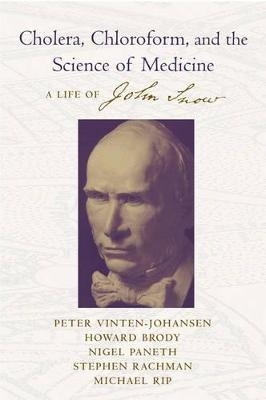
Cholera, Chloroform, and the Science of Medicine
A Life of John Snow
Seiten
2003
Oxford University Press (Verlag)
978-0-19-513544-2 (ISBN)
Oxford University Press (Verlag)
978-0-19-513544-2 (ISBN)
Offers interpretations of a pioneering figure in anesthesiology, epidemiology, medical cartography, and public health. This biography modifies the conventional rags-to-riches portrait of Snow by synthesizing information about his life from archival research and studies.
The product of six years of collaborative research, this fine biography offers new interpretations of a pioneering figure in anaesthesiology, epidemiology, medical cartography, and public health. It modifies the conventional rags to riches portrait of John Snow by synthesising fresh information about his early life from archival research and recent studies.
It explores the intellectual roots of his commitments to vegetarianism, temperance, and pure drinking water, first developed when he was a medical apprentice and assistant in the north of England. The authors argue that all of Snow's later contributions are traceable to the medical paradigm he imbibed as a medical student in London and put into practice early in his career as a clinician: that medicine as a science required the incorporation of recent developments in its collateral sciences, chiefly anatomy, chemistry, and physiology, in order to understand the causes of disease.
Snow's theoretical breakthroughs in anaesthesia were extensions of his experimental research in respiratory physiology and the properties of inhaled gases. Shortly thereafter, his understanding of gas laws led him to reject miasmatic explanations for the spread of cholera, and to develop an alternative theory in consonance with what was then known about chemistry and the physiology of digestion.
Using all of Snow's writings, the authors follow him when working in his home laboratory, visiting patients throughout London, attending medical society meetings, and conducting studies during the cholera epidemics of 1849 and 1854. The result is a book that demythologises some overly heroic views of Snow by providing a fairer measure of his actual contributions. It will have an impact not only on the understanding of the man but also on the history of epidemiology and medical science.
The product of six years of collaborative research, this fine biography offers new interpretations of a pioneering figure in anaesthesiology, epidemiology, medical cartography, and public health. It modifies the conventional rags to riches portrait of John Snow by synthesising fresh information about his early life from archival research and recent studies.
It explores the intellectual roots of his commitments to vegetarianism, temperance, and pure drinking water, first developed when he was a medical apprentice and assistant in the north of England. The authors argue that all of Snow's later contributions are traceable to the medical paradigm he imbibed as a medical student in London and put into practice early in his career as a clinician: that medicine as a science required the incorporation of recent developments in its collateral sciences, chiefly anatomy, chemistry, and physiology, in order to understand the causes of disease.
Snow's theoretical breakthroughs in anaesthesia were extensions of his experimental research in respiratory physiology and the properties of inhaled gases. Shortly thereafter, his understanding of gas laws led him to reject miasmatic explanations for the spread of cholera, and to develop an alternative theory in consonance with what was then known about chemistry and the physiology of digestion.
Using all of Snow's writings, the authors follow him when working in his home laboratory, visiting patients throughout London, attending medical society meetings, and conducting studies during the cholera epidemics of 1849 and 1854. The result is a book that demythologises some overly heroic views of Snow by providing a fairer measure of his actual contributions. It will have an impact not only on the understanding of the man but also on the history of epidemiology and medical science.
Introduction ; 1. York and Newcastle, 1813-1833 ; 2. Senior apprentice and assistant, 1830-1836 ; 3. London medical and surgical training, 1836-1838 ; 4. Forging a London career, 1838-1846 ; 5. Ether ; 6. Chloroform ; 7. Cholera theories: controversy and confusion ; 8. Snow's cholera theory ; 9. Professional success ; 10. Cholera and metropolitan water supply ; 11. Broad street ; 12. Snow and the mapping of cholera epidemics ; 13. Snow and the Sanitarians ; 14. Further developments in anaesthesia ; 15. Common ground: continuous molecular changes ; 16. Snow's multiple legacies
| Erscheint lt. Verlag | 5.6.2003 |
|---|---|
| Zusatzinfo | numerous black and white photographs and figures |
| Verlagsort | Oxford |
| Sprache | englisch |
| Maße | 236 x 155 mm |
| Gewicht | 788 g |
| Themenwelt | Literatur ► Biografien / Erfahrungsberichte |
| Medizin / Pharmazie ► Medizinische Fachgebiete ► Anästhesie | |
| Studium ► Querschnittsbereiche ► Epidemiologie / Med. Biometrie | |
| Studium ► Querschnittsbereiche ► Geschichte / Ethik der Medizin | |
| ISBN-10 | 0-19-513544-X / 019513544X |
| ISBN-13 | 978-0-19-513544-2 / 9780195135442 |
| Zustand | Neuware |
| Haben Sie eine Frage zum Produkt? |
Mehr entdecken
aus dem Bereich
aus dem Bereich
ein überfälliges Gespräch zu einer Pandemie, die nicht die letzte …
Buch | Hardcover (2024)
Ullstein Buchverlage
CHF 34,95


